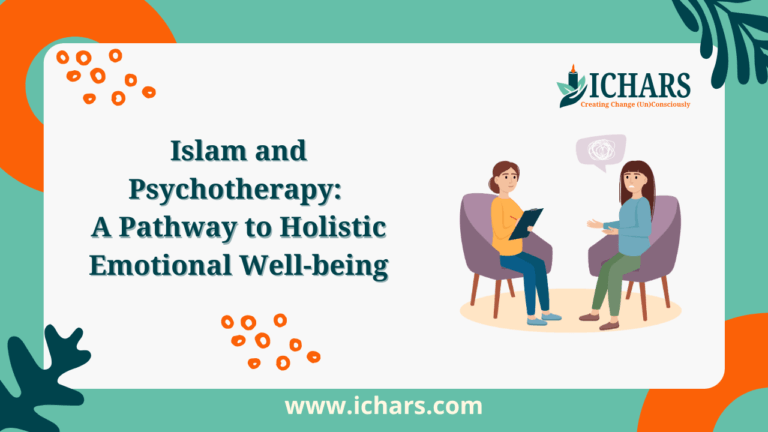In the evolving landscape of psychotherapy, the integration of spiritual, cultural, and philosophical principles is emerging as a cornerstone for achieving comprehensive emotional and psychological healing.
This approach recognizes the intertwined nature of mind, body, and soul, acknowledging that emotional well-being is inseparable from spiritual and cultural alignment.
Among these integrative approaches, combining Islamic principles with Cognitive Hypnotic Psychotherapy (CHP) stands out as a transformative framework.
This article presents an in-depth exploration of how CHP, a versatile therapeutic model, synergizes with the profound spiritual teachings of Islam to offer a holistic path to emotional well-being.
By aligning psychological practices with Islamic values, this integration facilitates not only emotional and mental healing but also fosters spiritual growth and connection with the Divine.
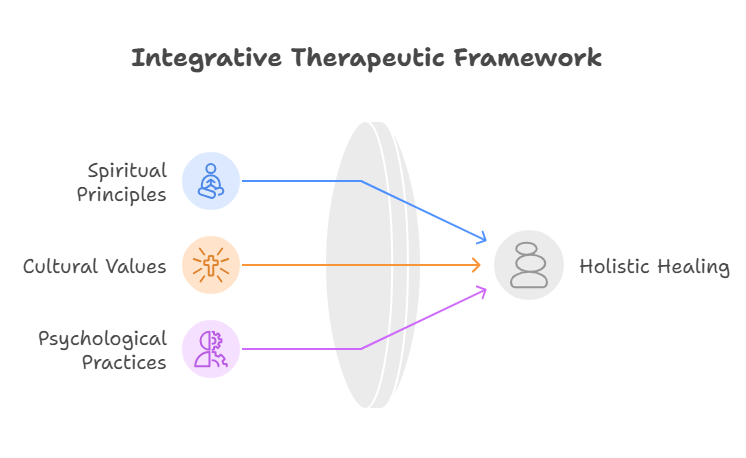
Understanding Islam’s Contribution to Emotional and Spiritual Well-being

Islam, a religion deeply rooted in spiritual enlightenment and moral guidance, offers a comprehensive framework for emotional well-being. Its teachings emphasize patience, gratitude, repentance, and compassion—principles that resonate strongly with therapeutic goals.
Key Concepts in Islam Related to Emotional Health
- Tawhid (Oneness of God): A fundamental concept, Tawhid fosters a profound sense of connection and trust in the Divine plan, encouraging resilience and hope during adversity.
- Sabr (Patience): Islam highlights the virtue of enduring hardships with grace, teaching believers to approach life’s trials with strength and composure.
- Shukr (Gratitude): The practice of gratitude in Islam redirects focus from scarcity to abundance, promoting a positive outlook and emotional resilience.
- Tawbah (Repentance): Encouraging self-forgiveness and renewal, Tawbah serves as a powerful tool for releasing guilt and fostering emotional liberation.
- Ihsan (Excellence in Deeds): Ihsan motivates individuals to strive for their best while maintaining a focus on spiritual and moral growth.
Islam’s emphasis on balancing worldly responsibilities with spiritual growth provides a unique foundation for integrating its principles into psychotherapy.
Cognitive Hypnotic Psychotherapy: A Brief Overview
Cognitive Hypnotic Psychotherapy (CHP) is an integrative therapeutic model that blends cognitive, behavioral, and psychodynamic approaches with hypnosis and other transformative techniques such as Neuro-Linguistic Programming (NLP), mindfulness, and emotional empowerment strategies. CHP focuses on:
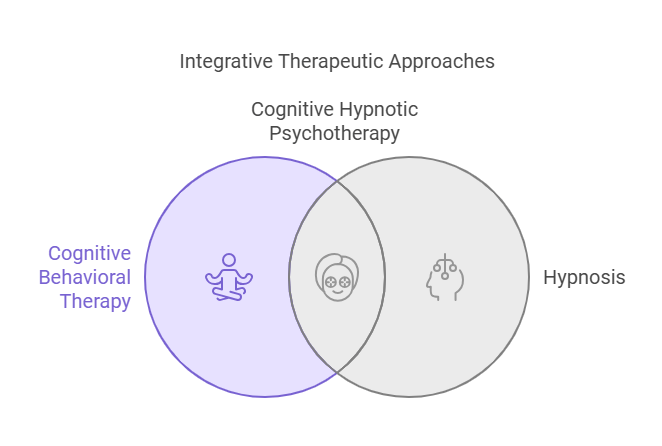
- Addressing Core Issues: Uncovering and resolving subconscious blocks that hinder emotional well-being.
- Personalized Interventions: Adapting techniques to align with each client’s values, beliefs, and goals.
- Holistic Healing: Targeting cognitive, emotional, and behavioral aspects to foster sustainable transformation.
The versatility of CHP makes it uniquely suited to incorporate cultural and spiritual dimensions into therapy, providing a rich platform for integrating Islamic teachings.
Synergy Between Islam and CHP
The integration of Islamic principles with CHP creates a therapeutic model that resonates deeply with Muslim clients. By addressing emotional, psychological, and spiritual dimensions, this approach offers holistic healing that aligns with their faith and values.
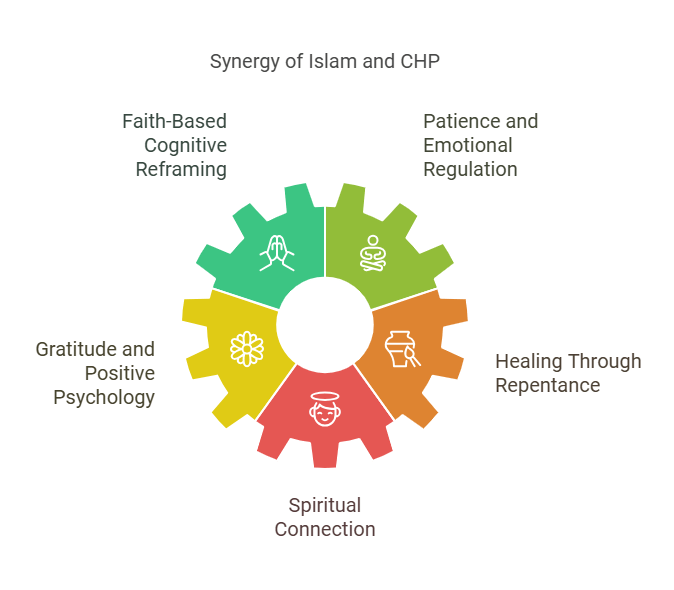
Key Areas of Synergy:
- Faith-Based Cognitive Reframing:
- Islamic teachings provide a framework for interpreting life’s challenges as opportunities for spiritual growth. CHP techniques like cognitive reframing can leverage these teachings to help clients shift negative perceptions to empowering narratives.
- Patience and Emotional Regulation:
- Sabr, a core Islamic value, aligns with CHP’s focus on developing emotional resilience. Techniques like mindfulness and emotional anchoring can reinforce the practice of patience in difficult times.
- Gratitude and Positive Psychology:
- Shukr’s emphasis on gratitude complements CHP’s use of gratitude exercises to cultivate positive emotional states and enhance overall well-being.
- Healing Through Repentance:
- Tawbah, which encourages self-forgiveness, integrates seamlessly with Timeline Therapy and regression techniques in CHP to address past traumas and release guilt.
- Spiritual Connection:
- Practices like Dhikr (remembrance of God) can be incorporated into CHP’s mindfulness exercises, creating a profound spiritual and emotional grounding for clients.
Practical Applications of Islamic Principles in CHP
Integrating Islamic teachings into CHP enhances its efficacy and relevance for Muslim clients. Below are some practical strategies:
1. Mindfulness with Dhikr
- Incorporate Islamic practices like Dhikr into mindfulness exercises. Clients can focus on phrases such as “SubhanAllah” (Glory be to God) or “Alhamdulillah” (Praise be to God) during breathing exercises to cultivate presence and spiritual peace.
2. Anchoring Gratitude
- Use CHP’s anchoring techniques to help clients associate gratitude with physical or emotional cues. This can reinforce Shukr, enabling clients to access positive states during stressful situations.
3. Cognitive Restructuring Through Faith
- Guide clients to reframe negative beliefs or emotions using Islamic narratives, such as viewing hardships as tests from Allah that strengthen faith and character.
4. Timeline Therapy with Tawbah
- Facilitate emotional release through Timeline Therapy by integrating the concept of Tawbah. Clients can revisit past experiences, seek forgiveness, and embrace renewal.
5. Visualization and Guided Imagery
- Leverage Islamic metaphors in visualization exercises, such as imagining divine light or envisioning walking toward a peaceful spiritual state, to inspire emotional healing and spiritual growth.
Case Study: Amina’s Journey of Transformation
Background: Amina, a 29-year-old Muslim woman, sought therapy to overcome feelings of guilt, anxiety, and spiritual disconnection. She wanted to address unresolved childhood trauma and reconnect with her faith.
Implementation:
- Initial Sessions: Focused on building trust and introducing Islamic mindfulness practices, including Dhikr, to create emotional stability.
- Timeline Therapy: Helped Amina revisit traumatic events and use Tawbah to release guilt and find emotional closure.
- Gratitude Exercises: Cultivated Shukr by encouraging daily reflection on blessings, fostering a more positive mindset.
- Cognitive Restructuring: Reframed her perception of challenges, emphasizing their role in spiritual growth and resilience.
Outcomes:
- Significant reduction in anxiety and guilt.
- Renewed sense of spiritual connection and purpose.
- Improved emotional resilience and coping skills.
Advancing Holistic Healing: Challenges and Opportunities
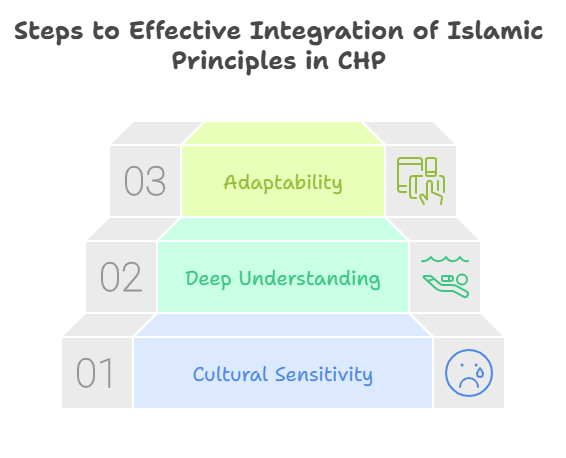
While integrating Islamic principles with CHP offers immense potential, it requires cultural sensitivity, deep understanding of Islamic teachings, and adaptability to individual client needs. Therapists must ensure:
- Cultural Competence: Respect and understanding of the client’s faith and cultural background.
- Ongoing Education: Continuous learning about Islamic teachings and their psychological implications.
- Personalization: Tailoring interventions to align with each client’s unique beliefs and experiences.
Conclusion
The integration of Islamic principles with Cognitive Hypnotic Psychotherapy represents a groundbreaking approach to holistic emotional healing. By blending spiritual wisdom with advanced therapeutic techniques, this model empowers Muslim clients to overcome emotional struggles, deepen their faith, and lead fulfilling lives.
It serves as a testament to the transformative power of aligning psychotherapy with cultural and spiritual values, offering a pathway to comprehensive well-being that addresses the mind, body, and soul.
